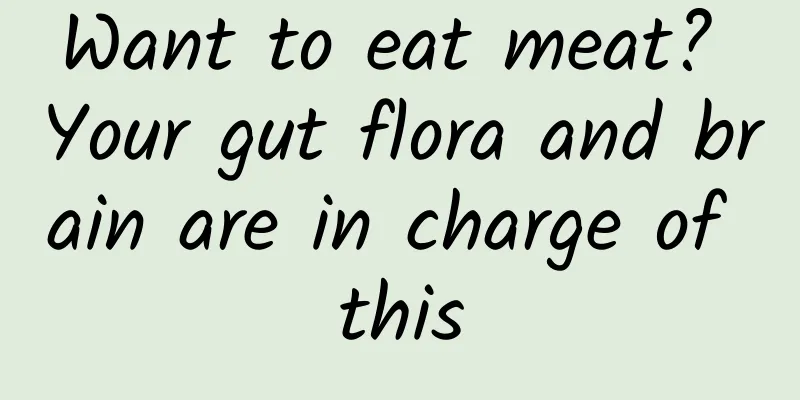Want to eat meat? Your gut flora and brain are in charge of this

|
Animals need a balanced intake of nutrients such as carbohydrates, proteins and fats to maintain health. Meat is rich in protein, but if you consume too much, it will be harmful to the human body because in addition to protein, it contains a lot of animal fat and cholesterol. Excessive protein contains a lot of nitrogen, which is decomposed by deamination and turned into urea and excreted in urine. This process requires a lot of water, which will increase the burden on the kidneys, and the harm will be greater if the kidneys are not in good condition. Eating too much meat will result in excessive intake of sulfur-containing amino acids, which will accelerate the loss of calcium in the bones and lead to osteoporosis. But if the diet is not protein-rich, it will lead to severe malnutrition. However, when protein intake is insufficient, animals will actively choose foods rich in protein or essential amino acids. A study from the Korea Advanced Institute of Science and Technology and Seoul National University found that fruit flies' food choices are influenced by a "dialogue" between the intestines and the brain, regulating their desire for foods rich in protein or essential amino acids. In fruit flies, the gut bacteria-gut-brain axis, commonly known as the bacteria-gut-brain axis, can detect whether essential amino acids are deficient and stimulate the fruit flies' desire for these amino acids. Scientists have known that when an organism does not get enough protein, it will preferentially choose foods rich in protein or essential amino acids, but they are not sure how this happens. Protein starvation in fruit flies triggers the release of a gut hormone called the neuropeptide CNMamide (CNMa) from specific intestinal cells. CNMa signals the nutritional status of the gut to the brain, triggering the desire to eat food containing essential amino acids. They also found that gut bacteria - Acetobacter bacteria - produce amino acids that can compensate for slight protein deficiencies in the diet. Supplementing this bacterium alone can produce amino acids that can alter the release of CNMa and alleviate the fruit fly's desire to "eat meat." However, gnotobiotic flies carrying mutant gut bacteria that do not produce leucine or other amino acids showed higher CNMa expression and greater appetite. Enterocytes sense amino acid levels from the diet and gut bacteria and communicate amino acid deficiencies to the brain via CNMa. Therefore, there may be a similar mechanism in the human body, that is, your desires are not necessarily controlled by you, and your intestinal microorganisms may also be involved. There is a more detailed explanation in the section on desire in my course. References: Boram Kim et al. Response of the microbiome–gut–brain axis in Drosophila to amino acid deficit. Nature, 2021, doi:10.1038/s41586-021-03522-2. |
Recommend
Can pregnant women take L-carnitine?
L-carnitine is a relatively common health product...
What is the best way to increase breast fat?
Many women will have this question: how to help b...
What women fear most is that their hair becomes sparse
The traces of time quietly appear at the corners ...
What to do if you have stomach pain two days before your period
Many people experience abdominal pain two days be...
Is fluoride application safe?
This is the 3157th article of Da Yi Xiao Hu The p...
How to take care of the tiger skin plant after buying it? What should you pay attention to when taking care of the tiger skin plant?
Tiger skin plant is very common in life. Because ...
Is it easier to get pregnant with light menstrual flow? Please see the answer from gynecologists
Female friends should closely observe their menst...
Myocardial ischemia-reperfusion injury: Autologous mitochondrial transplantation is comparable to cardiac surgery
Myocardial ischemia-reperfusion injury is a well-...
Pregnant women's checkup schedule
Whether you are an older mother or in the normal ...
Can I massage my shoulders while pregnant?
For some pregnant women who need to go to work, s...
What to do if your chest hurts after induced labor
Many women experience breast pain after induced a...
What are the benefits of back scraping? Do you know the 6 taboos of scraping?
Scraping is a health care method commonly used by...
Is iodine coloring better or not coloring better?
Many people think that the lack of coloration in ...









